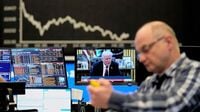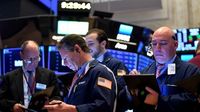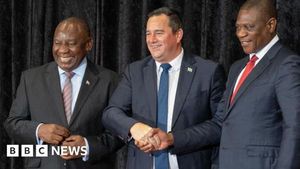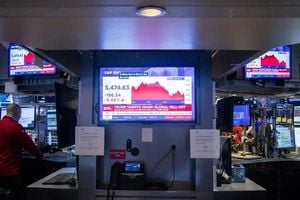In a bold move that has sent shockwaves through global markets, U.S. President Donald Trump declared April 2, 2025, as his "Liberation Day," introducing a series of reciprocal tariffs aimed at countries worldwide. This announcement, made during a ceremony at the White House, marks a significant escalation in the ongoing trade tensions between the United States and its trading partners, particularly the European Union and China.
The newly imposed tariffs will see a base rate of at least 10 percent on all imports, with specific rates reaching as high as 49 percent for countries like Cambodia and 34 percent for China. Goods from the EU will now face an additional 20 percent import tariff, a move Trump claims is necessary to counteract what he describes as unfair trading practices by these nations. "They charge us tariffs, we charge them tariffs," Trump stated, emphasizing the simplicity of his approach to trade. He further claimed that the EU imposes tariffs of 39 percent on American goods, a figure that has raised eyebrows among economists who argue that such calculations are overly simplistic.
Economists have reacted with alarm to the announcement, predicting significant disruptions in global trade flows. Harm Bandholz, a professor at the FH Kiel, noted that the magnitude of these tariffs could lead to a realignment of global trade patterns unless the U.S. retracts them quickly due to adverse economic consequences. Justin Wolfers from the University of Michigan described the tariffs as "enormously destructive" and based on outdated theories that could ultimately harm American workers more than any foreign competitor.
The immediate market reaction was stark. The Nikkei Index in Japan plummeted nearly 4 percent, while the DAX in Germany fell below the psychologically significant 22,000-point mark, dropping to 21,873 points, a decrease of 2.3 percent. The S&P 500 and Dow Jones indexes in the U.S. are also expected to open significantly lower, reflecting the widespread apprehension among investors. Major U.S. tech stocks suffered substantial losses, with Apple shares dropping 6.1 percent, resulting in a staggering loss of $205 billion in market value.
Gold prices, often seen as a safe haven during times of economic uncertainty, surged initially, reaching a record high of $3,167.84 per ounce before settling slightly lower. Analysts suggest that the increasing demand for gold reflects investor fears surrounding inflation and economic instability driven by the new tariffs.
In response to the tariffs, the European Union has signaled its intention to prepare countermeasures. Ursula von der Leyen, President of the European Commission, described the tariffs as a "heavy blow for companies and consumers worldwide," warning that they could lead to rising prices for essential goods such as food and medicine. "We are ready to respond," she stated, indicating that the EU is finalizing a package of measures to protect its interests should negotiations fail.
China has also condemned the tariffs, vowing to take countermeasures to protect its rights and interests. The Chinese Ministry of Commerce criticized the U.S. approach as a unilateral act of bullying, stating that no one wins in a trade war. The prospect of retaliatory tariffs from China looms large, particularly given that many products from China are now facing tariffs exceeding 50 percent.
The ramifications of Trump's tariffs extend beyond immediate economic impacts. Critics warn that these measures could exacerbate inflation in the U.S., as companies are likely to pass on the costs of tariffs to consumers. Bandholz pointed out that prices for affected goods will rise significantly, further straining American households already grappling with inflationary pressures.
In a rare show of dissent, the U.S. Senate passed a resolution opposing the tariffs imposed on Canada, with four Republican senators joining Democrats in the vote. This symbolic gesture reflects a growing concern among lawmakers about the potential impacts of Trump's trade policies on the economy.
As the dust settles from this latest round of trade hostilities, the global economic landscape appears increasingly precarious. Mark Carney, the Prime Minister of Canada, remarked that Trump's tariffs would fundamentally change the world trading system, underscoring the widespread apprehension among nations that rely on free trade for economic stability.
In the U.S., the Federal Reserve has recommended a pause in interest rate cuts, indicating a desire to assess the impact of the tariffs on inflation and economic growth. Investors are left to ponder whether Trump's aggressive trade strategy will yield the desired outcomes or plunge the U.S. into a recession, a scenario some analysts are dubbing a "Trumpcession."
As the situation unfolds, the world watches closely, waiting to see how nations will respond to Trump's tariffs and whether diplomatic efforts can avert a full-blown trade war.








